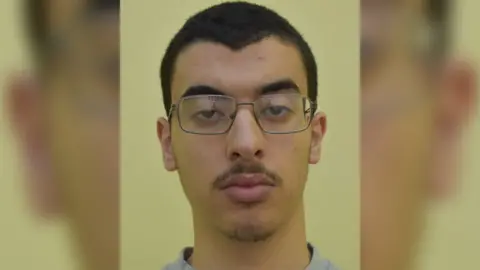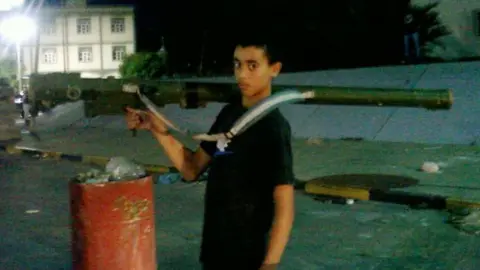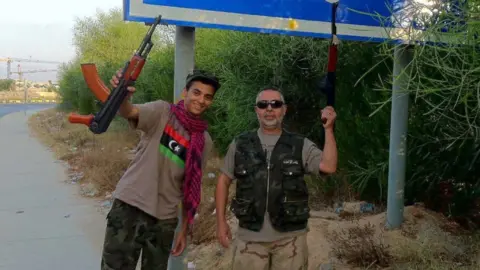Manchester Arena Inquiry: Hashem Abedi 'more influential' than bomber
 GMP
GMPHashem Abedi, who was jailed for his part in the Manchester Arena attack, was probably "more influential" than the bomber, an inquiry has heard.
Abedi, who is serving a life sentence, helped organise the attack his brother Salman carried out in 2017.
Extremism expert Dr Matthew Wilkinson told the Manchester Arena Inquiry the way the brothers divided their roles suggested Hashem was more dominant.
"The people that do the radicalising don't do the deed," he said.
Twenty two people were killed and hundreds more injured when a bomb was detonated in the foyer of Manchester Arena on 22 May 2017.
The inquiry into the attack has been looking at how Salman Abedi became radicalised.
Dr Wilkinson told a hearing that Hashem's online presence suggested he had had connections to, and sympathy with, extreme and violent Islamic views "since at least early 2014".
"Salman was chosen to do the deed," he said.
"The patterns of these things tend to show that the people that do the radicalising don't do the deed.
"So I would suggest… that the more influential of the two in terms of personality was probably Hashem."
 MAI
MAIThe inquiry was told several other people played crucial roles in Salman Abedi's path to extremism, including his father Ramadan, his older brother Ismail and convicted terrorist Abdalraouf Abdallah, who was a close friend of the bomber.
Dr Wilkinson said Ramadan Abedi had publicly declared his "Jihadist views" and "praising of martyrdom" on social media.
"This basic Islamic extremist world view had obviously percolated down a generation into his sons," he said.
He said Ramadan was "responsible for taking his sons out of school and to Libya on more than one occasion to engage in fighting" during the country's civil war.
Salman was "knocking around with militias" who had access to and were training people to use "heavy military equipment", he said.
"It meant the use of violence in the name of Islam was becoming even more normalised in his world view.
"It was just part of how his life was."
 MAI
MAIThe hearing was told Ismail Abedi, the elder brother of Salman and Hashem, also played a key part in his radicalisation.
Ismail left the UK to avoid giving evidence to the inquiry and an arrest warrant has been issued against him.
The inquiry heard he was stopped by police in September 2015 and among the documents found on his electronic devices was a text that called "specifically for terrible things to be done in the name of Islam".
Dr Wilkinson said because Salman and Hashem's parents were often out of the UK in the years before the attack, Ismail was effectively acting as their parent at a time when he was "becoming a strong sympathiser with the world view of [so-called] Islamic State and its core strategic aims".
He also said Abdalraouf Abdallah, who was jailed in 2016 after being found guilty of helping people travel to Syria to join the Islamic State group and recalled to prison in January, was "one of the major influencers" in grooming the arena bomber into his violent extremist world view.
The inquiry was told the pair, who were long-term friends, passed "intense communication" between them, even after Abdallah was jailed.
Abdallah has told the inquiry he did not radicalise Abedi and denied any knowledge of or involvement in the arena attack.
The hearing was also told that none of the religious institutions in Manchester visited by Salman Abedi were responsible for his radicalisation.
Dr Wilkinson said the management and teachings at Didsbury Mosque, where the Abedi family worshipped, "made no intentional contribution" to Abedi's radicalisation, but in an "attempt to please everyone" in its congregation, it had appeased a "small extreme Libyan faction who were supportive of terrorist groups fighting in the Libyan civil war".
A former imam at the mosque previously told the inquiry support for terror groups was preached there, though a trustee denied any radicalisation and said it was "a mainstream mosque welcoming all Muslims", which was "middle of the road".
Dr Wilkinson said in his view, the mosque was broadly mainstream, but had "more of an activist, perhaps occasionally Islamist, flavour than is possibly normal".
He also told the court that he believed Salman Abedi's journey into violent extremism was "quite a short one", which broadly started in late 2013, about three and a half years before the arena attack.
The inquiry continues.

Why not follow BBC North West on Facebook, Twitter and Instagram? You can also send story ideas to [email protected]
